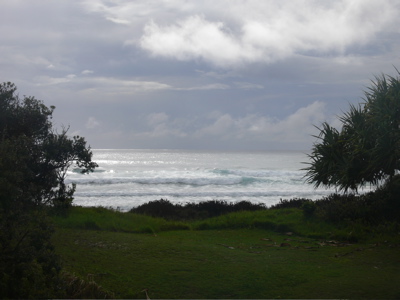Thursday November 8, 2007 5:10 am Lennox Head, NSW Australia
A. Morning Musings
5:10 am

It is raining at the moment, some times quite heavily. A good time to complete my notes for "Deep Simplicity". The news yesterday said that the last couple of weeks have been the coldest start to November in 20 years.
| Immediate |
Description |
Time |
| Science |
Complete making notes for "Deep Simplicity" |
1 hr |
| Literature |
Continue reading "Dylan on Dylan" |
1 hr |
C. Actual Learning Activities
6:40 am
Science 9
November 8, 2007
6:40 am
Continuing my notes for "Deep Simplicity" (2004) by John Gribbin.
Chapter 5 Earthquakes, Extinctions and Emergence
- Earthquakes are a good example of dissipative systems close to chaos.
- When the size of earthquakes are plotted against the frequency of occurrence (in a log-log plot) one finds a straight line, indicating that there is a power law relating the two variables. Basically this says that there are many more little earthquakes than large ones. It also says that the size of an earthquake is scale-invariant. This means that the size of an earthquake is independent of the size of previous earthquakes Both large and small earthquakes occur at random, but with different frequencies.
- "Power laws always mean that the thing being described by the law is scale invariant, so that earthquakes of any size are governed by the same rules." [p. 143]
- "But the other lesson from what we know about power laws ... is that you do not need a large trigger in order to set off a large event." [p. 157]
- "Having stripped the study of complexity down to its bare essentials, and found the same deep truth underpinning things as diverse as earthquakes, the stock market and the movement of human populations, we discover that it is all built on networks, interconnections between the simple parts that make up a complex system. The importance of such networks in general, and their specific importance for the emergence of life, has been investigated by Stuart Kauffman, of the Santa Fe Institute in New Mexico." [p. 163]
- It is time (when I return to Lethbridge) to look at Kaufmann's two books, At Home in the Universe and Investigations, both of which I have.
- "It is quite easy to see how a network of connections between the chemicals in the broth can arise, an autocatalytic network which sustains itself. This, argues Kauffman, is the way life arose - as a phase transition in a chemical system involving a sufficient number of connections between the nodes (individual chemical compounds) of the network. ... If the network is insufficiently connected, there is no life, but add one or two more connections and life becomes not only possible but inevitable." [p. 167]
- "Whatever the origins of life, though, ideas involving networks, connections and self-organized criticality provide powerful new insights into the way life operates once it has emerged." [p. 168]
Chapter 6 The Facts of Life
- The essence of Darwinian evolution can be summed up in three steps.
- Offspring resemble their parents. Characteristics are inherited.
- The process of inheriting characteristics is not perfect.
- There are more individuals born in each generation than survive to reproduce. [p. 176]
- "The great insight ... is that the individuals that survive are the ones that best fit into their surroundings. ... That is what is meant be 'survival of the fittest' ... Not the ones who are fit, the ones who do fit." [p. 176 - 177]
- "When one species changes, either through mutation or, in the most extreme case, through extinction, all the species it interacts with are affected." [p. 185]
- "The physical environment and the biological environment are interconnected, much more subtly than it seems at first sight." [p. 198]
Chapter 7 Life Beyond
- This chapter is a brief summary of the Gaia hypothesis of James Lovelock.
6:50 am
I have completed reading and making notes for "Deep Simplicity". I am also making good progress on reading "Dylan on Dylan". Overall I am pleased with my Learning activities while in Australia.
My pile of books still to be read is quite small, four.
- The War of the World by Niall Ferguson
- The Rough Guide to Ethical Living by Duncan Clark
- The Omnivore's Dilemma by Michael Pollan
- The Man Who Knew Too Much by David Leavitt
However my Drawing activities need to be increased. Having said that, my priorities are still to focus on the above five books (including Dylon on Dylan).
4:00 PM
We are back from a trip to Lismore to visit a couple of friends. On the return we stopped in Ballina and I was able to visit a music shop where I found a DVD of Bob Dylan's concert "Unplugged" recorded in 1994. I also bought a CD of Gordon Lightfooot's called "Summertime Dream".

